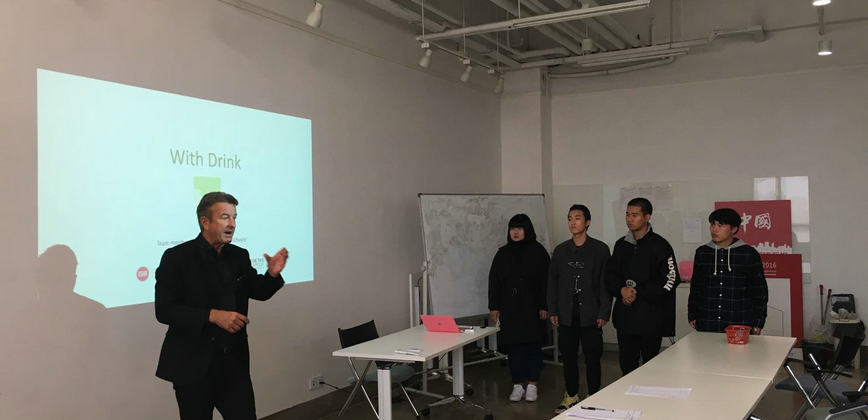
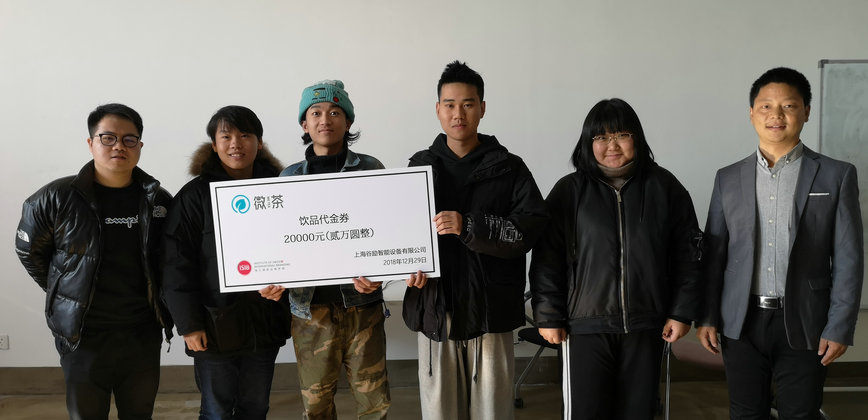

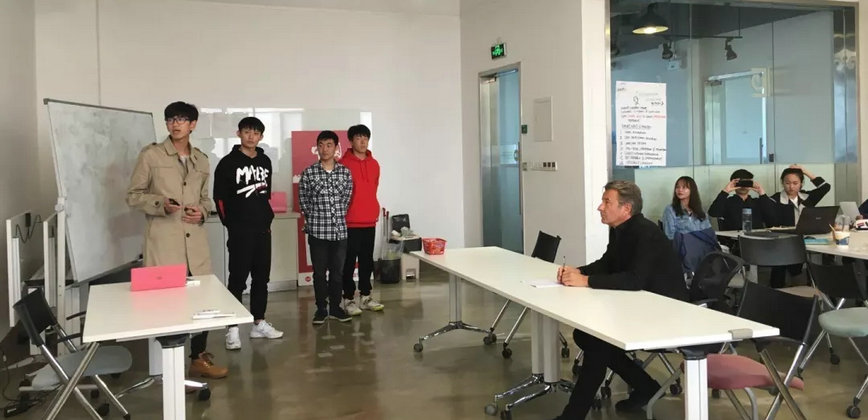
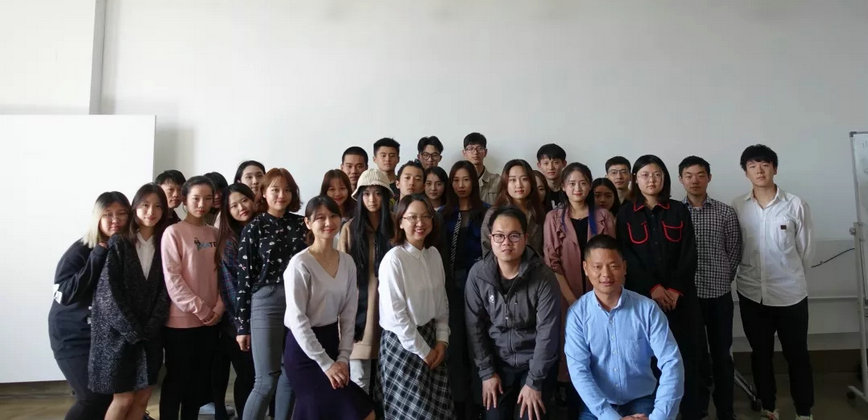
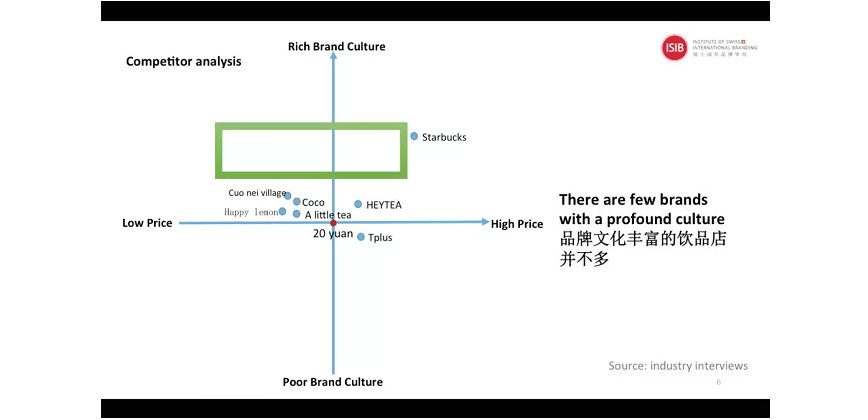
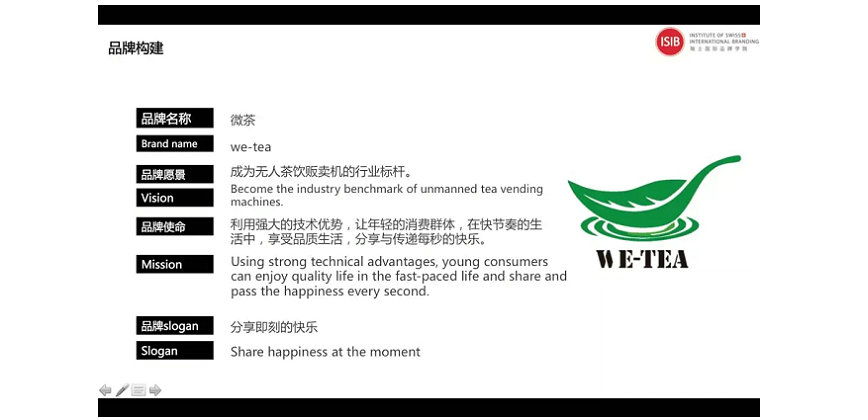

ISIB X Artificial Intelligence System X Future Business Concept
In this semester, ISIB 2017-Intake students finished an eight-week practical project: doing market research and branding for WE-tea Unmanned Tea Shop, organized by Studio Baeriswyl.
WE-tea project aims to launch an “unmanned tea shop”, using AI technology to promote new ways of tea sales. With unique products and sales machines as well as a fundamental business plan, the eight-week research project has deepened the students' understanding of market research and field investigation courses, strengthened their research ability in practical commercial projects, improved their ability of project analysis, and inspired them on brand positioning and brand design.
At the beginning of this semester, the students received an invitation from the brand. After a fundamental understanding of the business plan of the WE-tea project, the students were divided into several groups and each launched a research campaign.
Setting up the basic direction of the research, teacher Beryl invited the founder of the project, Mr. Zhu De’en, and the co-founder, Mr. Wang Gongxun, to the classroom. They discussed about the business plan of the WE-tea project with the class and introduced to them the unmanned tea machine that they were building. With the project founders in the class, the students knew much better about the brand. They were inspired to take different perspectives on the products and eventually acquired deeper knowledge about the course. That is the difference between independent communication with real interaction and the ordinary teaching methods.
The WE-tea project introduced the concept of healthy tea to customers through the AI technology of the unmanned tea shop. The various products planned in the project also fit the chic word “self-caring”. Moreover, the two founders also asked about the students’ suggestions on this project, which students expressed with great enthusiasm.
The meeting with the founders enabled students better understand the project. By using the research and data analysis methods they have learned, each group proposed a detailed and in-depth research result and put forward different plans for the project, such as highlighting the health characteristics of the products, developing customized DIY beverage models, etc.
When the project entered into the second half, Professor Baeriswyl came to the classroom to listen to the students' reports, and gave his notes and guidance on the research results and presentation skills. He encouraged the students to explore the brand's connotation, to focus on the details, and to clarify the definition of beverage and tea in the project so as to inject soul into the brand both rigorously and innovatively.
In the end, students rigorously adjusted their project analysis, investigation result and brand positioning to present to the project founders, who gladly expressed their appreciation to the students.
Industrial Case is a compulsory course as well as the key of the whole major. It embodies the core teaching philosophy of ISIB – the famous “Swiss Dual System” educational method, that is, every skill, concept and theory learned in the class must be practiced and tested under real circumstances. Students can not only have in-depth discussions and personal experience on branding in different fields, but also better understand how different industries implement brand strategies. Apart from knowledge and theories, students will, more importantly, gain first-hand working experience through real projects.
Proposals and Gains
Group one
Based on Project Manager Mr. Wang’s WE-tea business plan, we set up the general direction of our research: quality, health and self-caring; the convenience, taste, and diversity of the product itself; robotics and automation. The philosophy is to meet the needs of young people who are the largest consuming group of milk tea and to conduct targeted market research. The core is the quality of the product and the socializing function rather than health. Through market research, the group members were more aware of the importance of data and developed a better understanding of branding.
Group two
We have positioned the WE-tea project on socializing and health. The two word appearing frequently in the research of the team members showed that they are two major concerns of the consumers participating in the research. So the post-branding of WE-tea project was based on them. During the research, we strengthened our theoretical knowledge about market research and gained a clearer understanding of the current market dynamics by participating in field investigation. Moreover, we also got a preliminary understanding of business plan and brand positioning for the brand.
Group three
For Group 3, the WE-tea project is not only a practice of applying theories to the fields, but also an opportunity to exercise and improve one's ability. From the pre-market research to the later branding, the whole process has enabled us to gain better knowledge on the implementation of the entire project. According to the results of the research, we combined the concept and ideas of the founders of WE-tea project and built a tea brand with convenience as the core. Together with the strong technical advantages of the project, we provide a life experience with higher quality to and share the joy and happiness with the younger generation consumer groups.
Group four
Group 4 offers a new direction for WE-tea——DIY. This is based on field investigation and competitor comparison and research. Our strength relies on the advanced technology and raw materials of high quality. Nowadays young people are more willing to choose drinks that are both delicious and healthy, therefore our novelty and creativity will unleash grand market potential. With similar type of products appearing on the market, the major difference between WE-tea and them is DIY. DIY allows customers to experience the joy of making their own tea, in which way it is easier for customers to be satisfied and not to feel beguiled by the machine, so that without knowing the technology, customers will not call it some sort of vending machine. Actually, that is the clear distinction between WE-tea machine and the vending machine. Good taste combines with the advantage of vending machine will greatly increase the number of regular customers.
Through this project, we have deepened and expanded our understanding of branding instead of just knowing the concept superficially. As a group, we feel really pepped up and teamed up through the successful first try.
Group five
Starting from the PEST model, we summarized the characteristics of the beverage industry after a general investigation. Then through a further in-depth research based on brand culture, we hope to create a novel tea culture with the help of unmanned milk tea shops. Thanks to these efforts, we have learned about the market of unmanned tea machine, got to know some relevant business models and market situations. We even got better at teamwork.
Group six
The core idea ofthe WE-tea project is, first and foremost, what kind of milk tea can attract people and create regular customers; then we seek a balance between the taste and the health in milk tea. Through the WE-tea project, we discovered that the researcher's guidance plays a significant role in the respondents and that only if we integrate art into the brand, can we create attractive visual effect on the logo.









